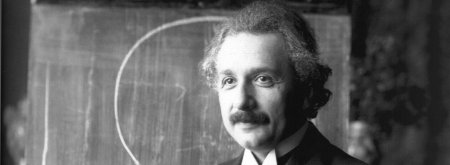A Long Way East of Eden
A Long Way East of Eden: Could God explain the mess we're in? examines the significance of the ‘God-question' and the impact of atheism – the loss of God in a culture.
The madman thrust in between them and fixed them with his eyes. ‘Where is God?' he shouted. ‘I'll tell you! We have killed him – you and I! We are all his murderers! But how have we done it? How could we drink the sea dry? Who gave us the sponge to wipe away the horizon? What did we do when we uncoupled the earth from its sun? Where is the earth moving to now? Where are we moving to? Away from all suns? Are we not running incessantly? Backwards, sideways and forwards, in all directions? Is there still an above and a below? Are we not wandering through an infinite nothing? Is not the void yawning ahead of us? Has it not become colder?' - Nietzsche
You know the question I mean, and its cumulative disquiet, its compound interest. You ask yourself the question... as you walk the streets among sons of thunder. New formations, deformations. You know the question. It reads: Just what the hell is going on around here? - Martin Amis, God's Dice
What follows is for the dissatisfied.
There are factors we need to explore that shape our world. There are times when we need to check what's happening to our lives, medium-term. We can speed down a motorway catching up on dictation, or floating far away with a i-Pod; but unless we check the road periodically, we end up wrapped around a juggernaut.
Our concern here is for realism, and for hope. Realism, because, among all our era's advantages, we sense something going wrong, and it would be good to know what it is. The Titanic's cooking was superb, but that didn't make up for their failure to notice the icebergs.
Yet also hope; because, as we look at the issues in our society, we begin to see them resolving into a pattern that might be understandable. Sometimes they appear incomprehensible: we sense something going wrong, but fear that beneath the surface there is nothing we can put our finger on, nothing but uncontrollable chaos.
Yet perhaps it isn't so. Maybe we are not powerless; maybe there is a piece we can insert into the jigsaw that makes some sense of the whole.
This book will explore the idea that many of our difficulties are connected; and, that in various ways they relate to the profound ‘turn' in our culture that we call the ‘death of God'. If this ‘death' lies at the heart of our contemporary dilemma – ‘postmodernity', as fashion has it – we need to understand it for what it is.
Now, a cross-cultural point: this writer is English, and a cultural mark of the English is that we distrust wide-ranging explanations and universal open-sesames. We're not optimistic Californians; we mastered Murphy's law in our cradles; we believe deeply that the bigger the idea, the less likely it is to work. As an Englishman, therefore, let me suggest that there is a logic to this suggestion which makes it worthy of some attention.
For most of us, ‘God' is a shorthand for things on a distant mental shelf; things that can safely be neglected, or have no reality at all. Yet, curiously, throughout history the vast majority of our race has been convinced of God's existence. Even today, much of humanity retains a faith in the truth of God and the supernatural. In most of the two-thirds world – in Nigeria, say, or Brazil or the Middle East – it can be hard to find really thoroughgoing materialists. We who live in the little European peninsula sometimes have an inflated view of the significance of our fashions of belief; assuming that what the North Atlantic countries affirm must always be the truth.
But what would it mean if the majority were right; if this fundamental, worldwide tendency to belief in God corresponded to some deep, accurate intuition of reality? ‘Western civilisation' – the culture being promoted in Rio, Manila, Lagos and Calcutta with all the impact our education and media systems can muster – obviously marginalizes God. It trains us to leave him out, forget him, carry on without him. God is simply not an issue: faith, where it exists, is a private oddity. (You believe, and that's OK for you; I don't, and that's OK for me.)
At a purely logical level, that attitude might not seem too clear-headed. After all, if there were a ‘Maker', then he / she / it could not, by definition, be merely ‘unimportant'. Ignoring ‘it' might mean losing sight of whatever purposes our world was built around. It might be like tossing out the central pieces of a jigsaw puzzle, yet still expecting the picture to make sense. And a few pieces should, here and there; but our carelessness could mean that, as a whole, the puzzle failed to fit together. (‘Things fall apart; the centre cannot hold', as Yeats put it early in modernity.) In so ultimate an issue, our choice could have far-reaching consequences.
These consequences are what we aim to explore. This book isn't an attempt to show the coherence of Christianity. It's more interested in the significance of the ‘God-question' in the first place. It aims to try out some ways of thinking: to explore some contours of the crisis facing us (and our children), and to see if the ‘loss of God' explains some of that data. If we know what the issue is, we can start to deal with it properly.
Inevitably, what follows is impressionistic. It would be impossible for any writer to be an expert in all the fields we'll touch (still less one who isn't a full‑time academic). The endnotes provide some pointers for further exploration. But the big, wide‑ranging questions are worth raising, even at the cost of academic delicacy. What I'm trying to ask is, Does it look this way to you? Do you think there's a trend here, a logical progression? Do you think this might get us closer to what's happening?
I'd like to dedicate what follows to the Russian, Baltic, Finnish, Belarussian, Dutch, German and Swedish students who provoked and endured its evolution. My hope is that readers among them, and elsewhere, will have their reflections on our culture – and its poets, philosophers, rock-prophets, social pressure-points – enhanced and stimulated. I hope, too, that some will catch a little of the excitement I've felt; glimpsing a possibility that the issues are starting to fit together; the possibility that, maybe, we can get it right….
But now let's turn to what's going on around – and inside – us...
Go to 1. Identity After God
© 2009 Pete Lowman
This article is reproduced with the kind permission of Pete Lowman.
This material was first published in 2002. We are grateful to Pete Lowman for his work in preparing it for publication on bethinking.org.



